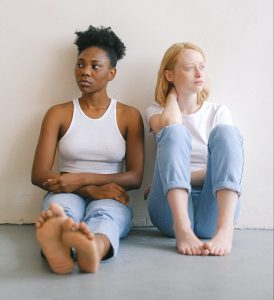*Black Americans are grieving. Your Black friends, co-workers, acquaintances, and the strangers you pass on the street are carrying a heavy weight on their shoulders and a sharp pain in their chest. In early May, they watched video of a Black man hunted down in the street in broad daylight. Just weeks later, they watched a Black man’s life choked out slowly in front of a crowd of witnesses on a city sidewalk. These horrifying moments were traumatizing. Many Black Americans envisioned their husband, son, brother – or even themselves – in those scenes. Others saw flashes of memories play through their mind – footage or photos of the deaths of Emmett Till, John Crawford III, Philando Castile, Tamir Rice, and so many others – like nightmares come back to life; trauma re-triggered. They are not okay.
I witnessed the same horrors and felt heartbreak and rage – but as a white woman, the impact is different. I cannot possibly know how it feels to be Black in America. I have not walked a mile in their shoes. I have not lived even a day in their skin. But I do know about loss, grief, and trauma.
As a woman who has worked with vulnerable communities in developing countries for 13 years, grief and trauma are a regular part of my professional life. As someone who lost four family members last year, my personal loss and grief still feel very fresh and raw. As a white woman, I cannot tell you the perfect thing to say or do to comfort your Black friend – but as a woman well acquainted with grief, I can give you a place to start . . .
Say something
When my infant nephew passed away in November, the most painful part of the aftermath was being with friends (or even acquaintances) who knew what happened, but didn’t acknowledge my loss. It was maddening for me to have people expect me to engage in small talk and pretend I wasn’t grieving. I wanted to SCREAM. I would think back on conversations at the end of the day and cry… convinced that people I thought loved me, didn’t really care.
Some of your Black friends might feel the same way. They know that you know what’s happening in our country . . . but do you care how they feel? Are you concerned about them at all? As my fellow BMC blogger Leesha recently shared with me, “Silence makes us have to guess.” Don’t make them have to wonder if you care. Dr. Martin Luther King, Jr. said that “In the end, we will remember not the words of our enemies, but the silence of our friends.”

“In the end, we will remember not the words of our enemies, but the silence of our friends.” – Dr. Martin Luther King Jr.
Say something. Even if you’re worried it’s the wrong thing – say that. Tell them “I’m not sure what to say right now. I don’t want to say the wrong thing . . . but I want to say something. I know these are heavy, heartbreaking times. I just want you to know I care.” When someone is grieving – fumbling (but sincere) words are so much better than silence.
They might not want to talk about it . . .
When grief is fresh, emotions are raw. It’s been seven months since my nephew passed away, and tears still come tumbling out when I say his name. It’s been six years since my husband tragically lost his best friend, but it’s still hard for him to talk about it. Don’t expect your Black friends or acquaintances to automatically open up and pour their heart out to you. They are emotionally exhausted right now. These images – and the fears that accompany them – are fresh in their minds. (And so are any personal memories of times they felt threatened themselves.) Don’t expect them to share their emotions with you. Don’t expect them to open up at all. Don’t make them relive past memories that are traumatic right now. You wouldn’t ask a friend who lost her spouse to cancer, to walk you through his entire treatment process and every hard day she experienced leading up to his death, would you? Consider your Black friends’ current emotional state, and don’t expect them to be in a place to “educate” you right now.
If you’re leaning in to learning about the shared experiences of Black Americans, then be willing to do some searching on your own. Find Black educators who are ready and willing to share with you. Look up videos on youtube or hashtags on twitter. There are so many ways to learn and to work to understand the perspective of our friends, coworkers, and acquaintances without making them do the emotional work to educate us all individually.
[Latasha Morrison (Be the Bridge) and Austin Channing Brown are two of the Black educators I’m learning from right now. I was also recently introduced to Brownicity, created by Lucretia Berry, as another resource that offers online anti-racism education courses. Be sure to follow these leaders’ and their organizations’ social media accounts too!]
They might want to talk about it . . .
Consider too, that they might want to talk about it. There have been times of grief when I just didn’t have the strength to share another thing, and I was too emotionally spent to say anything beyond “thank you” to someone who reached out. But then, there were times I needed to process my feelings. I wanted someone who would be a safe place . . . someone who would listen well and grieve with me.
It’s okay to tell your friends, “If you ever want to talk, I’m here. I’ll listen.” If they do open up to you – be that safe space. Lean in; open your arms, your heart, and your mind – and listen well. Believe them. Empathize with them. Grieve with them. Remember that one of the five stages of grief is ANGER, and don’t limit the ways they’re allowed to express their grief. Let yourself be uncomfortable. Let yourself feel their pain. Don’t dismiss their pain or explain it away. As Christian hip-hop artist Shai Linne recently shared, “One of the most hurtful things we can do is to make mourners justify their pain.” (I highly recommend that you read more of his story here.)
“One of the most hurtful things we can do is to make mourners justify their pain.” – Shai Linne
Take action
Anyone can send a text or a DM – but actions speak louder than words. When a friend is grieving, we usually do something to try and bring them comfort. We drop off flowers, put a handwritten card in the mail, or stop by with baked goods and time to talk. We often also give donations to show people that we care. If your friend lost a loved one to cancer, a donation to a cancer research foundation might be meaningful to them. This is the kind of gift that says, “I see your pain, and I want to do something to prevent this kind of hurt from happening to you or anyone else again.”
The same gift can be given to friends grieving the effects of racism today. If you’ve been moved by what is happening right now in America, then consider making a donation to a charity doing meaningful work to end racial injustice in our city, state, or nation.
Don’t forget
Most of all though . . . don’t forget. We are all familiar with the outpouring of love and care that comes when grief is fresh. But the meals stop, the flowers die – and the grief never goes away. It’s those friends who check in weeks, months, or even years later who really bring us comfort. The ones who remember the dates that might be painful, the seasons that might re-trigger trauma . . . or the ones that just recognize your heart will always ache (and are willing to talk about the reason why.)
Our Black friends bear the weight and grief of racism every day. If you ever do get a chance to listen, their stories will move you to tears. You have no idea how often their hearts are broken, time and time again, with everything from constant micro-aggressions, discomfort and exclusion – to threats, terror and blatant hatred. Be the friend who doesn’t forget. Be the one willing to listen when they need to grieve again. Keep giving. Keep working to prevent this pain (by continuing to educate yourself, getting involved in civic affairs, and voting with these issues in mind). Racism won’t be over when the protests end. Continue to hold space for their grief. Commit to showing sustained love and support. Remain a safe place for their weary hearts to turn long after these headlines stop trending.













